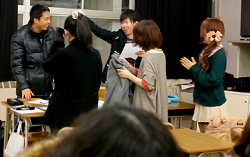References
Bertalanffy, L. V. (1972). The history and status of general system theory. Academy of Management Journal, 15(Dec), 407-425.
Daft, R. L., & Lengel, R. H. (1996, May). Organizational information requirements, media richness, and structural design. Managerial Science, 554-572.
DuBrin, A. J. (2000). Applying psychology: Individual and organizational effectiveness. New Jersey: Prentice Hall, Inc.
Duncan, B. (2013). Assessing the viability of team learning with remedial students in a lecture-based Japanese higher education culture. Ann Arbor, MI: ProQuest LLC, Fielding Graduate University. Retrieved from https://search.proquest.com/docview/1352039981
Jex, S. M., & Britt, T. W. (2014). Organizational psychology: A scientist-practitioner approach (3d ed.). New York: John Wiley & Sons.
Katz, D., & Kahn, R. L. (1996). The social psychology of organizations. New York, NY: John Wiley & Sons, Inc.
Mehrabian, A., & Weiner, M. (1967). Decoding of inconsistent communications. (A. a. 1. Mehrabian, Ed.) Journey of personality and social psychology (6), 109-114.
Robbins, S. P. (2003). Organizational behavior. New York, NY: Prentice Hall.
Schermerhorn, J. R., Hunt, J. G., & Osborn, R. N. (2007). Organizational behavior (9th ed.). New York: John Wiley & Sons, Inc.
Thomas, K., & Kilman, R. (1974, 2001). Thomas Kilman Conflict Mode Instrument. Psychologists Press. See https://kilmanndiagnostics.com/wp-content/uploads/2018/03/TKI_Sample_Report.pdf


![Communication is a process of negotiating to create shared understanding [Image: CoPilot] Communication is a process of negotiating to create shared understanding [Image: CoPilot]](/images/Images/a_man_and_a_woman_creating_shared_meaning_through_communication500.png)



![Your brain can keep growing, adapting, and learning at any age, if you are willing to put in the effort [Image: Copilot]](/images/Images/best-years-for-adult-brain300.png)
